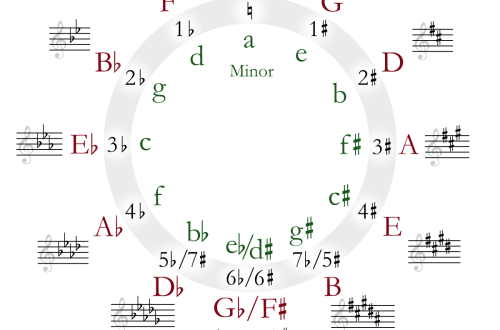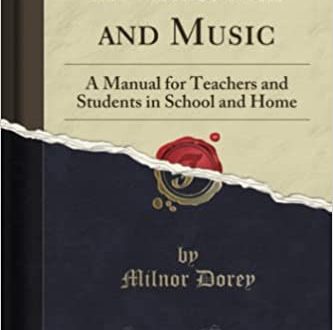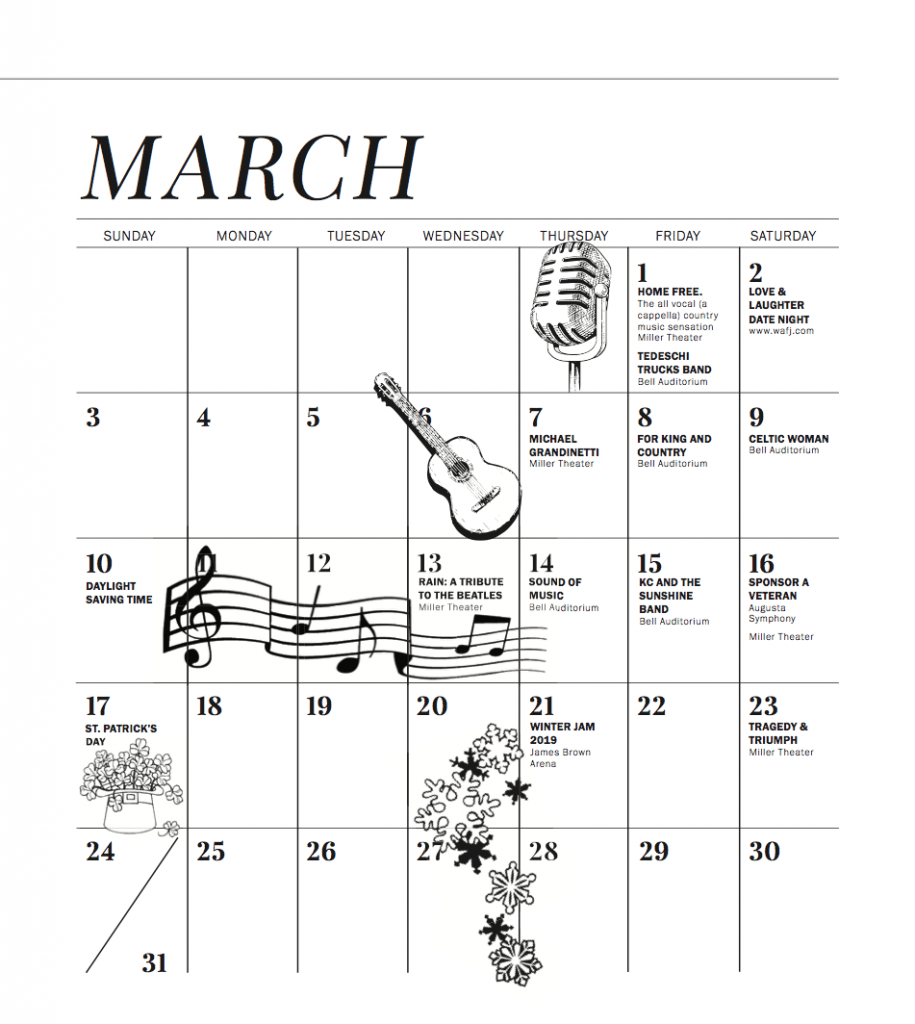
Music calendar – March
The first month of spring delighted fans of classical music with the birth of such venerable composers as Frederic Chopin, Nikolai Rimsky-Korsakov, Johann Sebastian Bach, Maurice Ravel.
March is also rich in talented performers. Svyatoslav Richter, Ivan Kozlovsky, Nadezhda Obukhova were born this month. And those are just the big names.
The Geniuses of the Classics
Opens the spring birthday parade Frederic Chopin. He was born in a small town Zhelyazova Wola near Warsaw. March 1 1810 year. All the colorful, multi-colored romanticism, requiring a variety of forms and genres, was expressed by Chopin in piano music. Forced to spend most of his life in France, the composer, however, was devoted to Poland. National Polish folklore permeated all of his music, thanks to which Chopin rightfully became a Polish classic.
2 March 1824 year born in Litomysl Berdzhih (Friedrich) Smetana, future founder of the Czech classical school. The composer directed all his multifaceted activities to the creation of professional Czech music. His most striking work, beloved by descendants, is the opera The Bartered Bride.
4 March 1678 year the world was the largest representative of the Baroque era – Antonio Vivaldi. He owns innovation in the genre of instrumental concerto and in orchestral program music. Fame brought him a cycle of four violin concertos “The Seasons”.
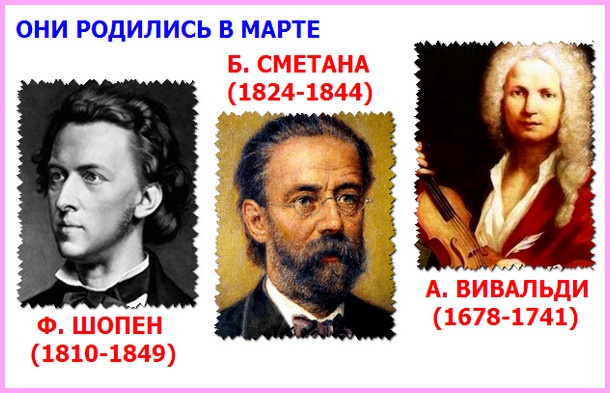
7 March 1875 year in the French Sibur in the family of a railway engineer was born Maurice Ravel. Thanks to the creative atmosphere skillfully created by the mother, the natural talents of the children were constantly developed. Ravel became the largest exponent of musical impressionism. Blurring of sounds was combined in his works with classical harmony of forms. And his famous “Bolero” sounds today from all the largest concert venues in the world.
18 March 1844 year in a family far from creativity, the future master of Russian culture, professor of orchestration and composition, author of numerous original works was born Nikolai Rimsky-Korsakov. A hereditary military sailor who made a round-the-world trip, he nevertheless preferred music, became interested in composing. The subsequent offer to become a teacher at the conservatory forced the composer to sit down at the desk almost simultaneously with his students and comprehend the fundamentals that he was supposed to teach them.
The legacy of the composer is huge and diverse. He touched on historical, lyrical, and fairy-tale themes. He often turned to the images of the East, creating the amazingly beautiful symphonic fantasy “Scheherazade”. During his 27-year career as a teacher, he produced more than 200 composers, among whom were A. Lyadov, I. Stravinsky, N. Myaskovsky, S. Prokofiev.
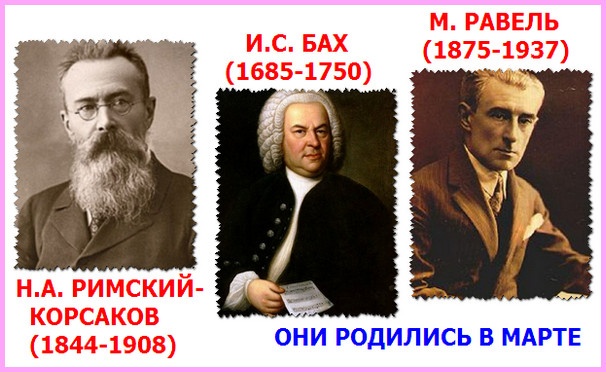
On the last day of March 31st of 1685 a composer was born whose radiance of talent will never fade – Johann Sebastian Bach. During his lifetime, he could not be called a darling of fate. He was not a miracle child, but, having been born into a family of hereditary musicians, he received a thorough education. During his lifetime, he gained fame as a virtuoso organist. And only 100 years after his death, his music gained fame. Now his 2- and 3-voice inventions are included in the compulsory training program for young pianists.
Muses favorites
March gave us not only great composers, but also no less talented performers loved by millions.
6 March 1886 year in Moscow, in an old noble family was born Hope Obukhova. Having started playing the piano under the guidance of her grandfather, the girl soon became interested in singing and began to study vocals in Nice with Madame Lipman, a student of Pauline Viardot.
Possessing a uniquely beautiful voice timbre, extraordinary artistry and perfect vocal technique, the singer brilliantly performed leading opera parts, including Lyubasha from The Tsar’s Bride, Martha from Khovanshchina, Spring from The Snow Maiden.
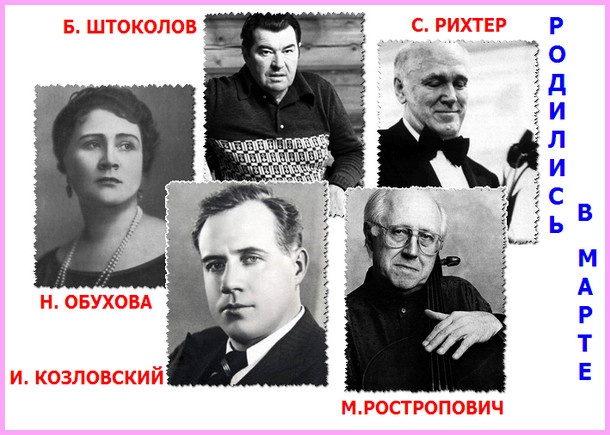
19 March 1930 year came into the world Boris Shtokolov, famous Soviet singer-bass. His singing career began during the war years, at the Solovetsky Jung School, where he was a company leader. Shtokolov was brought to the big stage by chance. Marshal Zhukov, in 1949 the commander of the Ural Military District, noticed the unusual abilities of a cadet of the Air Force special school. Instead of serving, the young man was sent to the Sverdlovsk Conservatory. Zhukov was not mistaken, Boris Shtokolov gained world fame and traveled to many countries of the world, representing the USSR on the famous theater stages of Italy, Spain, the USA, etc.
20 March 1915 year another musician was born, whose brilliant playing conquered and conquers the world musical community – pianist Svyatoslav Richter. It is surprising that this world-renowned performer was, to some extent, self-taught, who did not have those systematic lessons with playing scales and arpeggios, through which the bulk of future pianists go through. But his phenomenal performance, expressed in 8-10-hour daily lessons, and his extraordinary passion for piano playing allowed Richter to become one of the greatest pianists of our time.
Frederic Chopin – Mazurka in A minor, composition 17 No. 4 performed by Svyatoslav Richter
24 March 1900 year another great Russian singer was born – tenor Ivan Kozlovsky. He was constantly in search of new means of performance, worked on enriching the repertoire with new, little-known compositions. And his Holy Fool in “Boris Godunov” is a masterpiece, which no singer of our time has yet been able to surpass.
27 March 1927 year appeared to the world Mstislav Rostropovich: brilliant cellist, conductor, public figure. Over the years of his creative life, he was awarded many of the most prestigious musical awards, including inclusion in the “Forty Immortals” members of the Academy of Arts of France, an honorary member of the art associations of the USA, Japan, Sweden, etc. He has awards from 29 countries. For his diverse activities aimed at interethnic relations, the maestro is called “Gagarin of the cello” in art.
March premieres
Pleased with March and new productions. March 5, 1942 in Kuibyshev, the first performance of the legendary 7th symphony by Shostakovich, which he called “Leningrad” took place. In it, according to Alexei Tolstoy, one can hear the triumph of the human in man.
On March 29, 1879, opera lovers were able to attend the premiere of P.I. Tchaikovsky “Eugene Onegin”. This is an unsurpassed example of lyricism, a fusion of Pushkin’s poetic talent and Tchaikovsky’s melodic talent.
Author – Victoria Denisova



